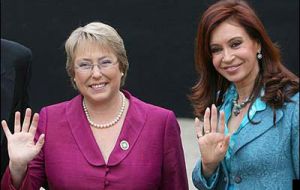MercoPress. South Atlantic News Agency
Argentina/Chile seal “historic” integration and cooperation agreement
 Ms. Bachelet and Mrs Kirchner reedit in Maipú historic events of two centuries ago
Ms. Bachelet and Mrs Kirchner reedit in Maipú historic events of two centuries ago Argentina and Chile will sign Friday an integration and cooperation agreement which is an update of the Peace and Friendship treaty of 1984 which paved the way for a close relation and dependency between the neighbouring countries that only a few years before had been on the verge of war.
The treaty is also in anticipation of the 2010 bicentennial independence celebrations of both countries which was achieved through the close collaboration of the two national heroes, Jose de San Martín and Bernardo O’Higgins, particularly in the battle of Maipú when the Spanish colonial forces were defeated by an integrated Argentine-Chilean army.
Precisely at the county of Maipú in the outskirts of Santiago Presidents Michelle Bachelet and Cristina Fernandez de Kirchner in a most symbolic ceremony will sign the integration treaty that sets the framework for the close bilateral relation and cooperation between Argentina and Chile.
A month later the two presidents will be meeting in the Vatican with Pope Benedict XVI to recall thirty years of the events of the Beagle Channel limits dispute in the extreme south of the continent, which almost led to a full fledged war and was stopped on last minute implorations from then Pope John Paul II.
That crucial action and Vatican intervention set the foundations for the Peace and Friendship treaty of 1984 that changed the long history of rivalry and mistrust between the neighbouring countries.
Mrs. Kirchner will also visit the Chilean Congress, meet the Judges of the Supreme Court and will officially inaugurate this year’s Books exhibition in Santiago dedicated to Argentine authors and literature.
The treaty has been in preparation for over a year following the Mount Aymond peace reaffirmation ceremony in the Chilean-Argentine border in Santa Cruz province where probably the first battles would have taken place in December 1978 if the Pope had not intervened. The dispute was over three islands in the Beagle channel which had remained unsolved for decades.
The new treaty contemplates an even closer relation between the two countries that share 5.000 kilometres of borders. Besides enshrining peace and friendship, practical issues of the treaty refer to social security; joint armed forces peace contingents to serve under United Nations; free circulation in border areas; extra tunnels under the Andes to facilitate transport and close cooperation in international policy affairs.
Argentina’s Foreign Affaire minister Jorge Taiana described the treaty as “historic” and a first of its kind because “it’s a qualitative leap that shows how close and tight is the network of relations between the two countries”.
“We believe the treaty reflects the power, diversity, richness and depth of our bilateral links”, said Taiana.
He added that the treaty opens the way for a new long term integration process, unrepeated in the Americas since it covers areas “such as economics, social security, education, culture, science and technology, armed forces, free circulation in border areas, and example of peaceful neighbourly understanding and commitment to development”
The new bilateral relation collects ranks and orders “the bilateral institutional achievements of the last 25 years in coherence with the legal systems of both countries”.
This is the third trip of Mrs. Kirchner to Chile since taking office in December 2007 and will be the culmination of “two very successful and productive years with the administration of President Michelle Bachelet” pointed out Taiana.




Top Comments
Disclaimer & comment rules-

Read all commentsIn other words, the Kirchnerist government have decided to give their blind eye to the inexcusable fact of who were allies with the UK in the 1982 South Atlantic War. What personal - what else? - benefit might the K's derive from this? It is hard to believe they have none.
Nov 03rd, 2009 - 02:40 am 0Commenting for this story is now closed.
If you have a Facebook account, become a fan and comment on our Facebook Page!